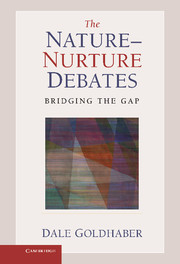5 - The New Debate
Published online by Cambridge University Press: 05 August 2012
Summary
The classic debate is a debate of opposites; the new debate is one of chickens and eggs. On the one hand, the classic debate simply has no resolution because nativists and empiricists cannot even agree on a dependent variable, much less a common methodology. The new debate, on the other hand, is not a dead end; it might just have a resolution. It won't be either the chicken or the egg, however, but it might just be the chick.
This chapter reviews, in turn, the two participants in the new debate, evolutionary psychology and developmental systems theory, and then we see where an integration of the two might just become possible.
Evolutionary Psychology
Most theories of human development focus on proximal variables, ones concurrent with the developmental events themselves or in the very recent past of the individual. This is certainly true of the nativists and empiricists of the classic debate. Evolutionary psychologists see things differently, very differently. Their focus is on the distal antecedents of our behavior and development, causes that are depicted as taking place a very, very, very long time ago.
There is no one theorist who ideas represent evolutionary psychology (EP), as might be the case if we were discussing Piaget or Freud. Rather, there are many people working within this tradition or perspective. Nevertheless, the most consistent and well-developed exposition of EP comes from the series of papers written over a number of years by John Tooby and Leda Cosmides (Cosmides and Tooby n/d; Tooby and Cosmides 1997; Cosmides and Tooby 2001; Tooby et al. 2003; Tooby and Cosmides 2005). I first summarize the model by reviewing their work and then present two variations on the model, one moving EP closer to developmental behavior genetics and the other closer to developmental systems theory (DST).
- Type
- Chapter
- Information
- The Nature-Nurture DebatesBridging the Gap, pp. 91 - 120Publisher: Cambridge University PressPrint publication year: 2012



